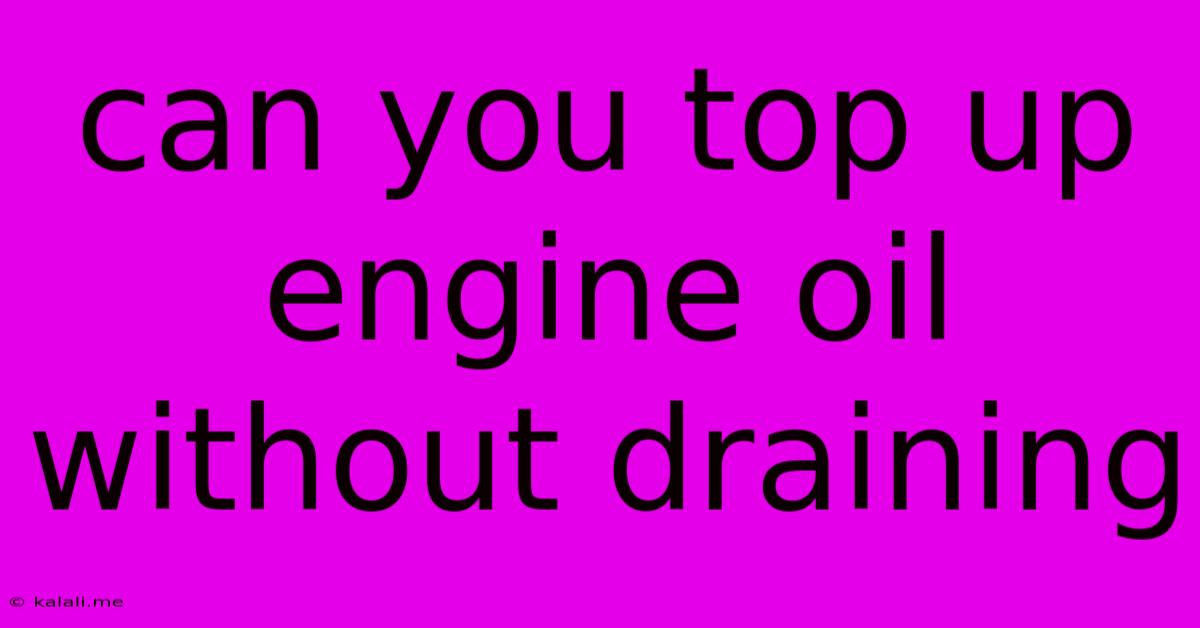Can You Top Up Engine Oil Without Draining
Kalali
May 19, 2025 · 3 min read

Table of Contents
Can You Top Up Engine Oil Without Draining? A Comprehensive Guide
Meta Description: Learn whether you can safely top up your engine oil without a full drain and change. We explore the pros, cons, and best practices for maintaining optimal engine oil levels. This guide covers everything from identifying low oil levels to understanding when a full oil change is necessary.
Maintaining the correct engine oil level is crucial for the health and longevity of your vehicle's engine. A common question among car owners is: can you top up engine oil without draining? The short answer is yes, but it's essential to understand the circumstances under which this is appropriate and the implications involved.
Understanding the Need for Engine Oil
Engine oil acts as a lubricant, reducing friction between moving parts and preventing excessive wear and tear. It also helps to cool the engine, remove contaminants, and protect against corrosion. Low oil levels can lead to serious engine damage, including seized bearings, piston damage, and ultimately, engine failure. Regular oil checks and top-ups are crucial preventative measures.
When Topping Up is Sufficient
Topping up your engine oil without draining is perfectly acceptable when:
- The oil level is simply low: If your dipstick shows the oil level is below the minimum mark but not significantly so, a top-up is usually all that’s needed. This is particularly common between scheduled oil changes.
- You've recently experienced a minor oil leak: A small, slow leak might gradually reduce the oil level. Topping up temporarily addresses this while you investigate and fix the underlying leak.
- You're preparing for a longer journey: Ensuring your oil level is optimal before a long drive provides an extra layer of protection.
When Draining and Replacing is Necessary
Topping up isn't a substitute for a full oil change. You should drain and replace your engine oil when:
- The oil is old and dirty: Over time, engine oil degrades and loses its lubricating properties. Following the manufacturer's recommended oil change intervals is vital. This is typically measured in miles driven or months passed.
- The oil is contaminated: Contaminants such as fuel, coolant, or metal particles can compromise the oil's effectiveness and damage the engine.
- The oil is significantly low: A dramatically low oil level suggests a major leak, requiring immediate attention beyond simply adding more oil.
- You've noticed unusual changes in your engine: Unusual noises, decreased performance, or excessive smoke from the exhaust could all point to significant engine problems requiring professional inspection and potentially an oil change.
How to Safely Top Up Your Engine Oil
- Identify the correct oil type: Consult your owner's manual to determine the appropriate type and viscosity of engine oil for your vehicle. Using the incorrect oil can damage your engine.
- Locate the oil filler cap: This is typically marked with an oil can symbol.
- Slowly add oil: Add small amounts at a time, checking the dipstick frequently to avoid overfilling. Overfilling can be just as harmful as underfilling.
- Check the dipstick: After adding oil, wait a few minutes for it to settle before checking the level again using the dipstick. Ensure the level is between the minimum and maximum marks.
- Tighten the oil filler cap securely: Ensure the cap is properly tightened to prevent leaks.
The Importance of Regular Oil Changes
While topping up is a convenient solution for minor oil level drops, it's crucial to remember that it's not a replacement for regular oil changes. Regular oil changes ensure that your engine operates with clean, fresh oil, maximizing its lifespan and performance. Always consult your owner's manual for the recommended oil change intervals for your specific vehicle. Ignoring these recommendations can lead to costly repairs down the line.
By understanding when to top up and when to perform a full oil change, you can ensure your vehicle's engine remains healthy and performs optimally for years to come. Remember, preventative maintenance is key to long-term vehicle reliability.
Latest Posts
Latest Posts
-
To The Best Of My Knowledge
May 19, 2025
-
How To Say For You In German
May 19, 2025
-
How Do You Say How About You In Japanese
May 19, 2025
-
How Many Rakats In Zuhr Prayer
May 19, 2025
-
Can You Make Cheese Sauce With Self Raising Flour
May 19, 2025
Related Post
Thank you for visiting our website which covers about Can You Top Up Engine Oil Without Draining . We hope the information provided has been useful to you. Feel free to contact us if you have any questions or need further assistance. See you next time and don't miss to bookmark.